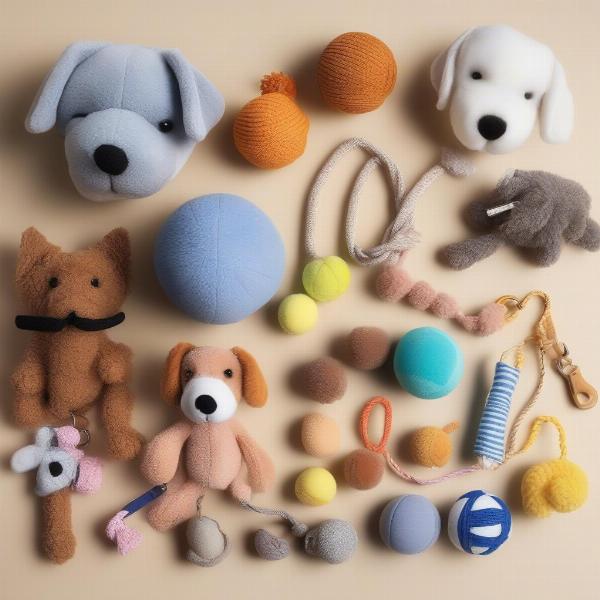Dogs eat toys for a variety of reasons, and understanding why your furry friend engages in this behavior is crucial for their safety and well-being. From teething puppies to bored seniors, toy destruction can be a sign of several underlying issues. This article will explore the common causes of toy-eating in dogs, potential health risks, and provide practical solutions to help you manage this sometimes destructive habit.
Understanding the Reasons Behind Destructive Chewing
Why do dogs eat toys in the first place? Several factors can contribute to this behavior. Puppies, for example, often chew and ingest toys as part of the teething process. The act of chewing helps relieve the discomfort of incoming adult teeth. Adult dogs might chew and eat toys due to boredom, anxiety, or even as a way to relieve stress. Certain breeds are also predisposed to destructive chewing, particularly those bred for retrieving or herding. Additionally, a lack of appropriate chew toys can lead a dog to target inappropriate items, including their own toys.
Potential Health Risks of Ingesting Toys
While some toy destruction is normal, ingesting pieces of toys can pose serious health risks to your dog. Swallowing small parts can lead to choking hazards, gastrointestinal blockages, or even perforations. Some toys contain toxic materials that can be harmful if ingested. It’s essential to choose safe, durable toys specifically designed for dogs and to supervise your dog during playtime.
Choosing the Right Toys for Your Dog
Selecting appropriate toys is crucial for discouraging destructive chewing and preventing toy ingestion. Look for durable toys made from non-toxic materials. Consider your dog’s size, age, and chewing habits when choosing toys. For powerful chewers, opt for robust toys designed to withstand vigorous chewing. Puzzle toys and interactive toys can help keep your dog mentally stimulated and reduce boredom-related chewing.
 Safe Dog Toys
Safe Dog Toys
Managing Your Dog’s Toy-Eating Habits
If your dog eats toys, there are several steps you can take to manage this behavior. Provide plenty of appropriate chew toys to redirect their chewing instincts. Rotate toys regularly to keep your dog interested and engaged. Supervise your dog during playtime and remove any damaged toys immediately. If boredom or anxiety is suspected, increase physical exercise and mental stimulation through training, walks, and interactive play.
Is My Dog Eating Toys Because of a Medical Condition?
In some cases, excessive chewing and toy ingestion can be a sign of an underlying medical condition, such as pica (the craving for non-food items) or nutritional deficiencies. If you’re concerned about your dog’s toy-eating habits, consult with your veterinarian to rule out any medical issues.
Conclusion
Understanding why your dog eats toys is crucial for their health and safety. By addressing the underlying causes, providing appropriate toys, and supervising playtime, you can help your furry friend develop healthy chewing habits and avoid the potential dangers of toy ingestion. Remember, a little preventative care can go a long way in ensuring your dog’s well-being.
FAQ
- Why does my puppy eat his toys? Puppies often chew and ingest toys due to teething and exploring their environment.
- What are the risks of dogs eating toys? Ingesting toys can cause choking, intestinal blockages, and exposure to toxins.
- What kind of toys are safe for dogs? Look for durable, non-toxic toys designed for dogs, considering their size and chewing habits.
- How can I stop my dog from eating toys? Provide appropriate chew toys, supervise playtime, and address underlying issues like boredom or anxiety.
- When should I consult a vet about my dog eating toys? If the behavior is excessive or you suspect a medical condition, consult your veterinarian.
- Can a lack of nutrients cause a dog to eat toys? Yes, nutritional deficiencies can sometimes contribute to pica, the craving for non-food items.
- Are certain dog breeds more prone to eating toys? Some breeds, particularly those bred for retrieving or herding, may be more inclined to destructive chewing.
Related Articles on ILM Dog
About ILM Dog: ILM Dog is your trusted source for expert advice on all aspects of dog care, from breed selection and puppy care to senior dog health and training tips. We offer a wealth of information to help you navigate the joys and challenges of dog ownership, including guidance on nutrition, grooming, and finding the perfect products for your furry friend. We strive to empower dog owners with the knowledge and resources they need to provide the best possible care for their canine companions. For personalized advice or to learn more about our services, contact us at [email protected] or call us at +44 20-3965-8624.